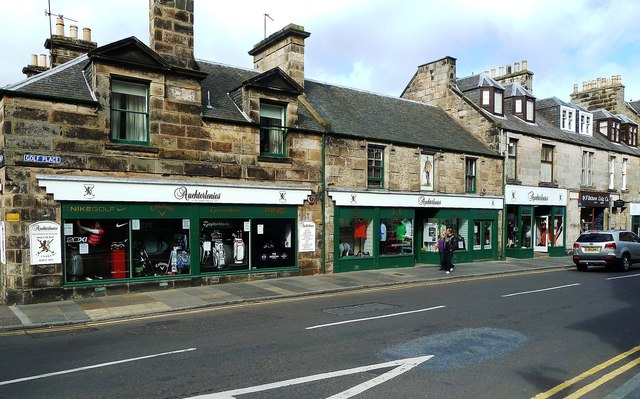Auchterlonies of the St. Andrews has been ranked the No. 1 golf business in Fife.
In a special St. Andrews Citizen supplement, and the fifth of its kind, the newspaper has compiled a top-100 of businesses of all-time in the Kingdom of Fife.
There is no surprise in the top-10 with the Leven based Diageo being able to raise a glass in being named No. 1 and the company itself now the world’s biggest producer of whisky.
 Auchterlonies comes in at No. 46 and is one of only three Fife located golf businesses to make the top-100.
Auchterlonies comes in at No. 46 and is one of only three Fife located golf businesses to make the top-100.
The St. Andrews company sits just a wedge shot from the 18th green on the Old Course and was established in 1895, by brothers Tom, David, and Willie Auchterlonie.
Willie was Open Champion in 1893 at Prestwick and also professional to the Royal and Ancient Golf Club at St. Andrews from 1937 to his passing in 1863. In fact, the 50th anniversary of his death was celebrated on March 2nd earlier this month.
And given also its superb location, Auchterlonies continues to be one of the most popular golf shops in St. Andrews.
Ranked No. 56 is Forgan and the oldest golf club manufacturer in the world that was established in St. Andrews in 1860.
Forgan’s owes its establishment to the Society of St. Andrews Golfers, later The Royal and Ancient Golf Club of St. Andrews who hired a local carpenter, Hugh Philip to make golf clubs for its members.
When Philip died in 1856, his nephew Robert Forgan took over the company and was the founder of Forgan Golf four years later. The company was appointed as official golf club maker to the Prince of Wales. Following World War 2, the company struggled to keep pace with modern club manufacturing and closed in March 1963. However, the brand was re-ignited in 2008 and now is operated by Sports PLC.
George Nicol Golf Clubs is ranked No. 72 among Fife’s top-100 greatest businesses.
George Nicol was born in 1861 and the company is famous for the leather-faced cleek of 1892. The club was supposed to absorb some of the impact of striking the hard guttie ball and to protect a player’s hands.
The company also made a ‘flutted face’ pitcher, a nibbed-face made around the end of World War 1 when deep grooves were added to clubs to increase back-spin, but were later outlawed by the R & A. By 1925, the firm was producing a number of special clubs such as the ‘Zenith’, the ‘Recorder’, the Viking’ and the ‘Indicator’ all of which used a ‘hand’ with a dark palm area.
Clubs made by Nicol before 1893 were stamped ‘G. Nicol, Leven’.
Of course, many of the businesses listed in the top-100 are no longer operating but as the newspaper rightfully indicates: “Most of them are part of our living heritage rather than living concerns in 2013.”



